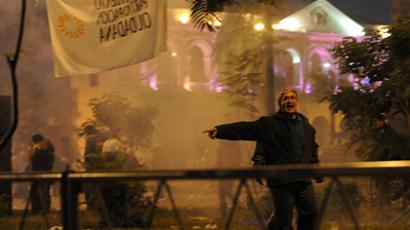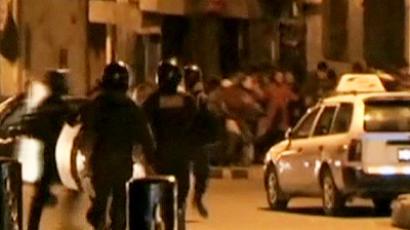Paraguay 'coup': Outside job?
The democratically-elected leader of Paraguay was voted out of power by a mostly right-wing parliament after a brief trial. Many believe it was a coup, largely orchestrated from outside, while the president’s successor is trying to validate the move.
The ousting of President Fernando Lugo triggered domestic outrage as well as criticism from Paraguay’s neighbors. Latin American free trade groups Mercosur and Unasur have suspended the country’s membership, increasing its international isolation.
From democracy to ‘democraship’
Asia Times correspondent Pepe Escobar believes impeachment was orchestrated from outside Paraguay for economic interests. In an interview with RT, he listed those who, in his opinion, benefited most from Lugo’s removal.“First of all, [those are] international agribusiness, like Monsanto and Cargill, because they are devastating enormous tracts of land in Paraguay for [its] agribusiness to be sold to the international market,” he told RT.Other “beneficiaries” include Brazilian land owners, Escobar continued, who “own a lot of land in Paraguay,” local “comprador elites” who are sufficiently represented in the country’s parliament and control the media, and also the United States. The latter is attempting to “torpedo” any push towards integration in South America.“The international financial system and international agribusinesses, allied with Brazilian landowners, who own huge tracts of land, especially in eastern Paraguay, near the Brazilian border, and of course the American Embassy in Asuncion – which is, as our friends in Iran would say, a nest of spies. So all these interests converge to find the way to install a sort of democratic coup against Lugo,” Escobar said. “They used the technicality to launch an impeachment process that lasted between 24 and 48 hours. This is unheard of in modern democratic political history!”Escobar believes that the official explanation by senators, who accused the central government of the incompetence, does not hold any criticism.“It was a setup. And it was provoked to find the way to get these things to the parliament so they could arrange [the] impeachment. This is what is called nowadays, in South America especially, a ‘democraship’. And it soon can be exported to other parts of the world, including the Middle East,” the journalist concluded.
‘Threat to internal powers’
New-York-based author and lawyer Eva Golinger explained why the country’s major economic and political powers, who initiated Fernando Lugo’s impeachment, felt that their interests were threatened by his presidency.“President Lugo… came from beyond of status quo in Paraguay. He is not from the traditional economic or political elite. He is not an oligarch, he is not a part of the 2 per cent of the wealthiest in the country who own the majority of land in Paraguay,” she told RT. “So this was in many ways a threat to the powers that have been in Paraguay.”Fernando Lugo also began strengthening ties with neighboring nations, Golinger continued, including “leftist-leaning governments” in Brazil, Argentina and Venezuela, as well as with Bolivia and Ecuador. “This began even more so to threaten those very powerful economic and political interests in Paraguay,” she concluded.
America’s foot in Paraguay’s door
Eva Golinger notes there were other “interests from abroad” too.“The US has been trying to establish military base there. They’ve had their feet in the door for some time now – Lugo was preventing that,” she explained. “And I just think that in the end they decided they had to do it now before it was too late, and Lugo implemented more reforms that would affect very powerful economic interests in the country.”Nikolas Kozloff, an author who has written extensively on South America, echoed Golinger, saying that Lugo's policies did not sit well with the US government.“To pursue an independent foreign policy in Latin America does not go over very well in Washington, and we know this clearly from WikiLeaks cables [saying] that US diplomats expressed displeasure at Lugo’s independent foreign policy, specifically forging links with Hugo Chavez of Venezuela, and with Bolivia as well,” he told RT. “Lugo questioned US military involvement, which was extremely controversial.”The author acknowledged though that there is no direct indication on whether the US played a role in the impeachment. “I’m not claiming that, but if you ask me whether the US had a motive – probably, in light of the correspondence. And also it’s clear that the US was spying on Lugo,” he said.The distinction between the US State Department and the intelligence gathering operations, like the CIA, is getting more subtle here, Kozloff went on to explain, because it did come out that Washington had a great deal of suspicion about what Fernando Lugo was doing, while Condoleezza Rice and Hillary Clinton inquired on his personal data.
‘Validating the coup’
Meanwhile, Paraguay's newly-sworn-in President Federico Franco asks for understanding from other nations and says that there was no “coup.”James Petras, a professor of sociology at the Binghamton University in New York, explains that Franco is an “opportunist” and a “compromised candidate” who was selected by Lugo as a running mate, future vice-president, in order to placate an oligarchy. His sole job right now is to try to end the diplomatic and regional isolation of Paraguay.“The government, as it stands today, is seen as illegitimate. And [Franco’s] presidency is called into question. So above all, everything else, Franco is now in search of legitimacy and engaged in a diplomatic mission which up to now has not succeeded. And I think there’s a big question mark on his rulership [sic]."I don’t think he has a political and economic agenda besides trying to legitimate the illegitimate coup,” the scientist concluded.














